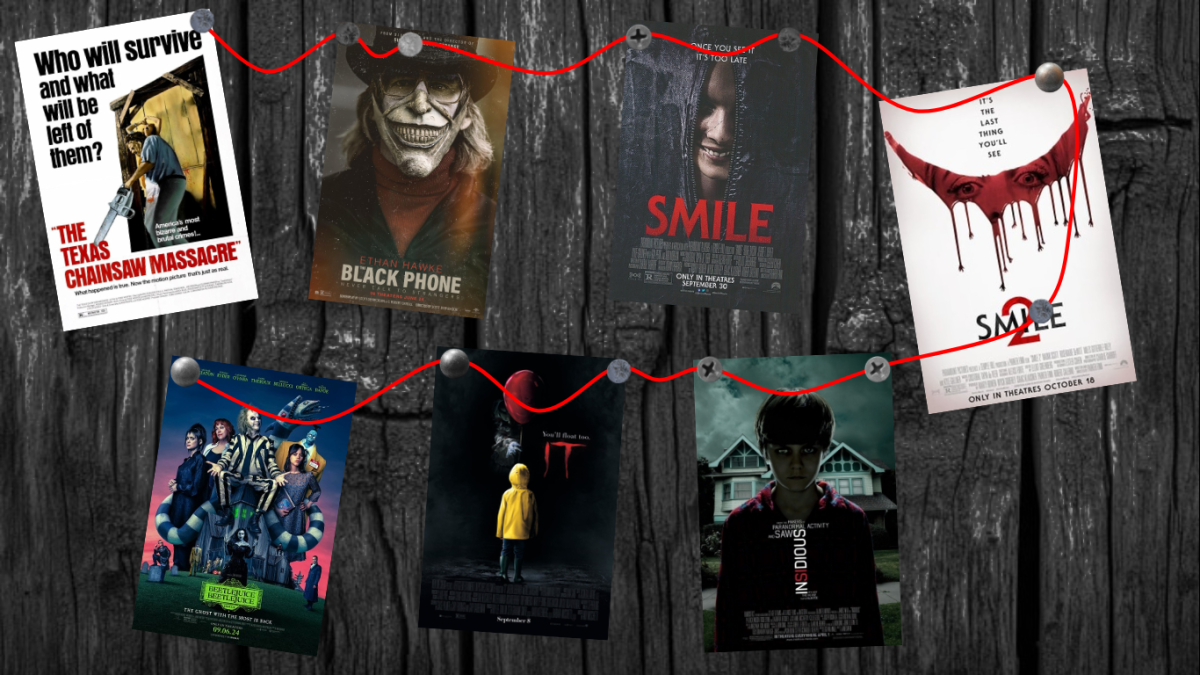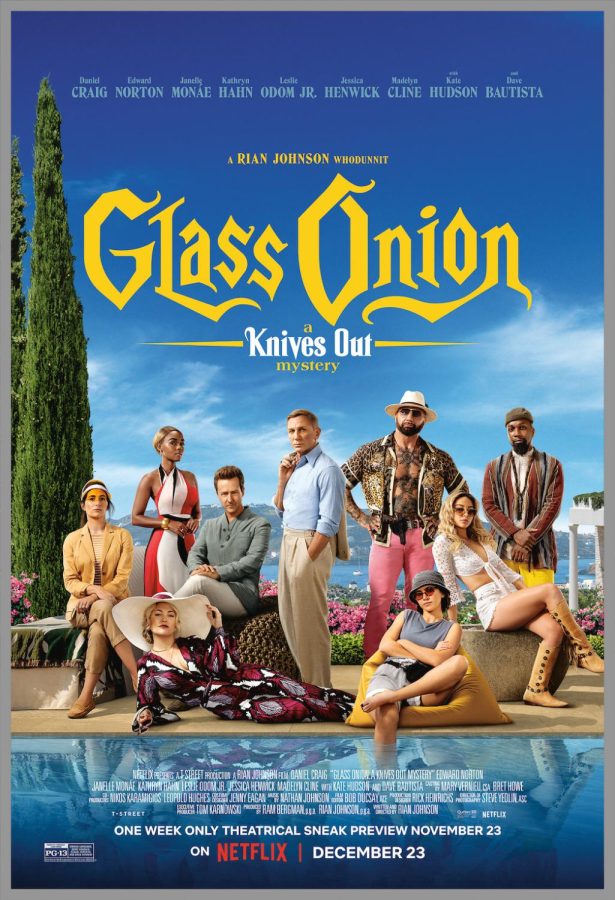Peeling Back the Absurdity of “Glass Onion: A Knives Out Mystery”
With a theatrical premiere on Nov. 23 and a Netflix release on Dec. 23, “Glass Onion: A Knives Out Mystery,” was a highly anticipated sequel to the original, fan-favorite film: “Knives Out,” released in 2019.
With an all-new, star-studded cast featuring industry names such as Edward Norton and Janelle Monáe, “Glass Onion” brought viewers another humorous, yet completely different, murder mystery to enjoy over the winter break. The film did have some continuities in front of and behind the camera, however, as lead Daniel Craig returned to his role as Detective Benoit Blanc, investigator of the wealthy elite, and Rian Johnson returned as director.
January 19, 2023
When The Beatles released their song “Glass Onion” in 1968, they had one intention in mind: create a song to confuse those who looked for hidden meanings in their music. The song was purposely filled with references to their past hits, confusing audiences with the bizarre mix to showcase the irony in looking for something that isn’t there. “Glass Onion” is a song about other songs, just as “Glass Onion: A Knives Out Mystery” is a murder mystery about other murder mysteries. Although this style choice came at the expense of disapproving some loyal “Knives Out” connoisseurs, the reference in the film’s title is exactly what the irreverent and complex film promised, executed, and delivered on.
The film, like its predecessor, follows Detective Benoit Blanc (Daniel Craig) as he attempts to navigate the dangerous entrappings of an affluent group of people. This time, however, the main focus is a group who, on the outside, would appear as the last people to be old friends, known as “the disruptors.” Ultimately, their primary link is their connection with tech billionaire Miles Bron (Edward Norton), who invites his eclectic friends for a getaway on his private Greek island. This invitation to a murder mystery party, one Detective Blanc wasn’t actually supposed to receive, turns into a reality of sorts when someone actually turns up dead.
While Bron’s former business partner turned outcast, Cassandra ‘Andi’ Brand (Janelle Monáe), and Detective Blanc seem to be the interlopers, they’re not presented as the main suspects. From disgraced model Birdie Jay (Kate Hudson), to Connecticut Governor Clair Debella (Kathryn Hahn), and Twitch streamer Duke Cody (Dave Bautista), each friend rightfully has their own motives, leaving no one deemed innocent. As the film progresses, we see all seven suspects, bit by bit, analyzed through the lens of Blanc as an outsider, leaving plot holes and misconceptions galore for the audience to piece together. As his interactions with the group increase, Blanc not only sees the true nature of the friends’ relationship with Miles Bron, but also their overall incentives, whether it be for fame, for money, or just for help in getting out of a tricky situation. Each character has their own complex and muddled views on who they are, ideas Johnson accentuates through his filmmaking style.
A key component in all murder mystery films is the effectiveness of the storytelling. “Glass Onion” not only boasts a longer runtime than “Knives Out,” but also a completely different setup. While “Knives Out” depicted a family and their dysfunction, while also leading people astray by supposedly revealing the killer in the first act, “Glass Onion” follows a superficial friend group in a more leisurely pace, leaving audiences borderline agitated.
However, timing wasn’t the only thing leaving audiences unsatisfied. From the unbearable quarantine references to the difference in demeanor of the crime, viewers were left comparing the two films, ultimately declaring the original “Knives Out,” the best of the two. This backlash is something Johnson expected, turning the tables on the audiences, and their unrealistic expectations of watching something exactly the same, something that captures that very same magic in a bottle. In fact, Johnson didn’t even want the film to be written off as the second installment of the series. “I’ve tried hard to make them self-contained,” Johnson told the Atlantic. “Honestly, I’m pissed off that we have ‘A Knives Out Mystery’ in the title. You know? I want it to just be called ‘Glass Onion.’
As much as there are mixed reviews, the film skillfully combines various factors in order to achieve a different take on the classic murder mystery. While hilarity, foolishness, and scandal were all crucial factors in making the first installment of the series so memorable, it’s the way “Glass Onion” uses them that still makes it an enjoyable watch. From recreating the infamous Elizabeth Holmes Theranos vial picture using a paper napkin, to Jared Leto brand kombucha, the movie uses its ridiculousness to its advantage.
Regardless of certain disapproval, the film has the ability to captivate, perplex, and humor, a rollercoaster of emotions, all within two hours and 19 minutes. By not looking for the deeper meanings within the most simplest of sentences, critics and audiences alike greatly enjoyed this film, a notion supported by an 92% approval score on Rotten Tomatoes.
As Beatles member John Lennon once wrote in a letter to a student, “all my writing… has always been for laughs or fun or whatever you call it – I do it for me first – whatever people make of it afterwards is valid, but it doesn’t necessarily have to correspond to my thoughts about it, OK? This goes for anyone’s ‘creations,’ art, poetry, song, etc. – the mystery and [ideas] that [are] built around all forms of art need smashing anyway.” “Glass Onion” does exactly that, without worrying about things like normal structure. Instead, the story opts for the more obscure side of things, a decision that, hate it or love it, brought a new twist on the age old story of “Who Dunnit?”
“Glass Onion: A Knives Out Mystery” is streaming on Netflix now.
























![The Phoenix varsity volleyball team lines up for the national anthem. “We were more communicative [with each other] during this game, and I feel like we kept our energy up, especially after the first set,” senior Jessica Valdov said.](https://theblazerrhs.com/wp-content/uploads/2024/10/DSC_0202-1200x800.jpg)










![Junior Alex Alkhal pitches the ball. “[I] just let it go and keep practicing so we can focus on our goal for the next game to get better as a team,” Alkhal said.](https://theblazerrhs.com/wp-content/uploads/2025/05/DSC_0013-1-1200x929.jpg)
























